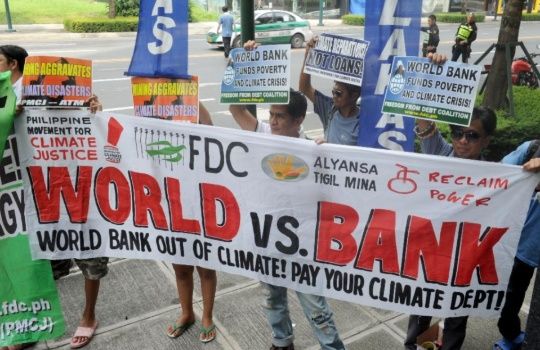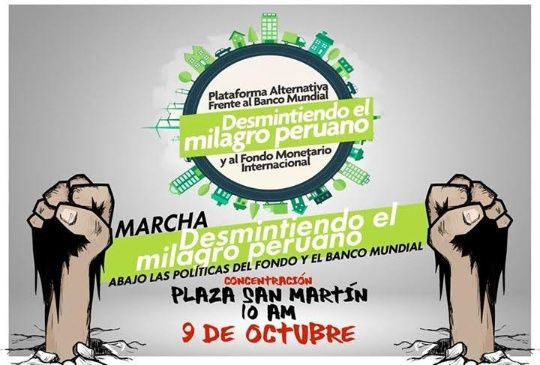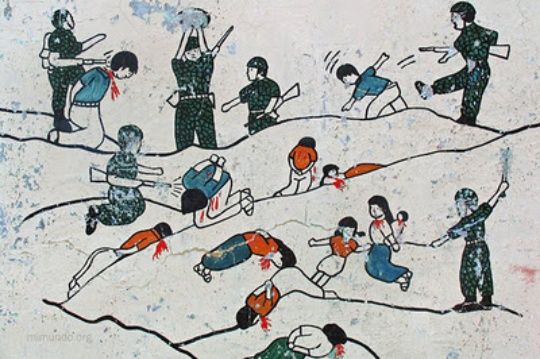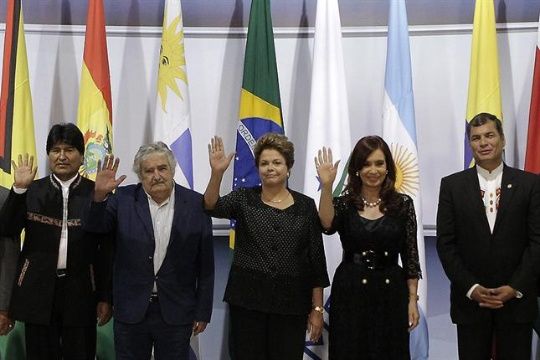Peru is hosting the 2015 annual meetings of the World Bank Group and the International Monetary Fund, making it the first Latin American country to do so since 1967. Among the issues addressed will be the World Bank’s second set of policy proposals on social and environmental standards, which was made available to the public last August. READ MORE

"For most purposes, the World Bank is currently a human rights-free zone. In its operational policies, in particular, it treats human rights more like an infectious disease than universal values and obligations," stated U.N. Special Rapporteur on Extreme Poverty and Human Rights Philip Alston. READ MORE
By Nate Singham
A new study found that over the last 25 years the Peruvian government has aggressively pursued foreign direct investment in order to finance large-scale infrastructure projects, as well as controversial extractivist projects, often at the expense of human rights, environmental sustainability, and economic justice. READ MORE

By Luis Manuel Claps
It is time the World Bank and IMF pay their debt accrued from the social and environmental costs of their projects in Peru, Argentina, and every country where they operate across the globe. READ MORE
By Gretchen Gordon and Pia Marchegiani
When it comes to human rights, the World Bank, an institution that delivers an average of US$30 billion in assistance each year, plays ignorant, innocent and impotent. READ MORE
By Heather Gies
In Honduras, the World Bank has funded a known coup-backer, murderer, and narcotrafficker, while escalating a decades-long land conflict and undermining local food security. READ MORE

By Grahame Russell
In 1982, Guatemalan soldiers and civil defense patrollers carried out four large-scale massacres against Rio Negro villagers to make way for a World Bank-funded hydroelectric dam. Over 440 women, men, and children were slaughtered. The Bank continues to avoid accountability. READ MORE
By Tanya Kerssen and Eric Holt-Giménez
It is difficult to overstate the degree to which the International Monetary Fund and World Bank-promoted cocktail of liberalization, deregulation, and privatization contributed to extreme vulnerability for farmers and peasants. READ MORE
By Andrew Self
The history of IMF involvement in Latin America can be traced back the 1980s, known as the lost decade, during which Latin America experienced its worst economic crisis since the Great Depression. READ MORE

By Cyril Mychalejko
The significant gains made in Latin America in reducing poverty, especially in countries led by left-wing governments that reject the neoliberal economic pushed by the World Bank and IMF, proves that not only are there alternatives to neoliberalism, but that these alternatives are more humane and effective in creating egalitarian societies. READ MORE
By Nate Singham
Since Bolivian President Evo Morales was first elected in 2005, the government has established a new set of guidelines which protects Bolivia’s economic autonomy from predatory lending institutions such as the IMF and the World Bank. READ MORE
Thousands of Peruvians March on IMF Meeting in Lima
'Lima Declaration' Calls for Egalitarian Approach to Investment
Study Reveals World Bank's Environmental Contamination in Peru
An Interview with Dave Eden: The IMF as an Everchanging Enemy